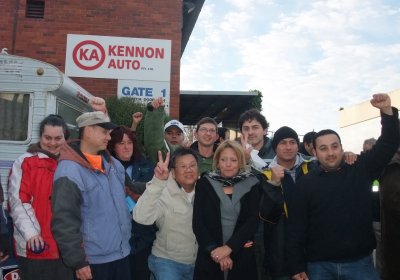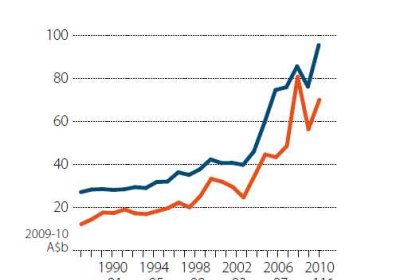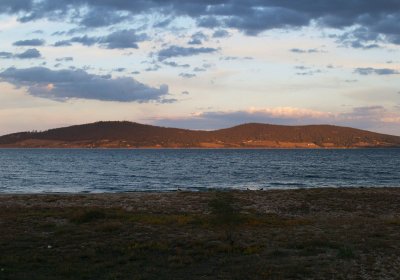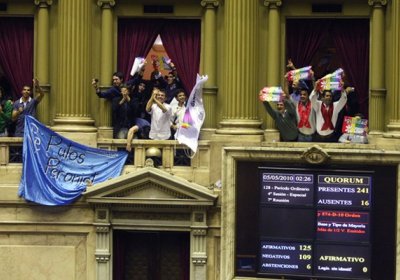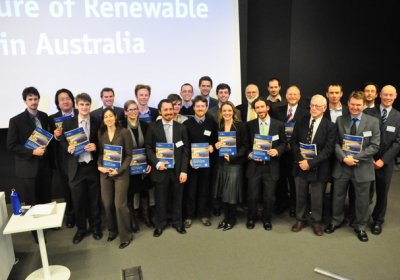Fidel Castro Handbook By George Galloway MQ Publications, 2006 Review by Ramona Wadi In the introduction, to the Fidel Castro Handbook author George Galloway describes himself as “a partisan for Cuba, for the revolution, for the leadership”. While a partisan view may be shunned in journalistic terms Galloway has no hesitation in embracing a revolution and being loyal to a cause that inspired working class and other exploited people throughout the world.
845
Twenty-four of the 50 Kennon Auto workers who are members of the Textile Clothing and Footwear Union have been on strike since July 1 for a pay rise. The rise has been denied to them for the past three years.
Police and the company are increasing the pressure to break the picket line, but the community has been mobilising to support the striking workers.
Workers at local factories have walked off the job at short notice to supplement the workers' protest at vital moments, preventing trucks from breaking through.
Peoplequake: Mass Migration, Ageing Nations & the Coming Population Crash
By Fred Pearce
Corgi Books, 2010, 352 pages
Review by Martin Empson
In the 200 years since the Reverend Thomas Malthus first penned his tract, An Essay on the Principle of Population, the question of the “carrying capacity” of the planet has repeatedly appeared.
Most recently, mainstream debates around how to solve the question of climate change have boiled down to the simplistic argument that “there are too many people”.
Just days after the ALP replaced Kevin Rudd with Julia Gillard as PM, Rio Tinto boss Tom Albanese delivered a blunt warning to governments around the world, especially Third World governments, not to be tempted to go for what he called “resource nationalism”.
“As you know, the original May proposal for a super tax caused a furious national debate in Australia”, Albanese told a gathering of mining executives and big investors at Lord's in London.
Twenty years ago, superannuation was an employment benefit enjoyed only by public sector workers and management level employees in the corporate sector. Most workers had no access to superannuation.
Today “super” is an “industry” of great value and interest to finance capital. The $1.3 trillion in superannuation funds came in handy when the ongoing “great financial crisis” (GFC) began in 2008. It was a lifeline for Australian corporations caught short.
What happened to create this behemoth?
Tasmanian Premier David Bartlett announced on June 22 that he “accepted the [state] Planning Commission’s recommendation” to reject the Lauderdale Quays canal estate proposal at Ralphs Bay. “It found the proposal was unsustainable, and not consistent with the objectives of the planning system or the state coastal policy”, Bartlett said.
Argentina’s Senate narrowly approved a measure on July 15 legalising same-sex marriage, the New York Times said that day. The NYT said Argentina is the first Latin American nation to allow gay couples to wed.
The bill, which was sponsored by the government of President Cristinia Fernandez, was passed by 33-27. On July 15, Prensa Latina said Fernandez congratulated the Senate, saying the bill will allow for the protection of the rights of a minority.
Months out from the September national elections, the eyes of football-crazy Brazil have been focused on the World Cup.
Discussions have centred on the performance (or lack thereof) of the men in the national football team. But it is three women who have been making the biggest impact on politics — especially on the left.
About 650 people packed into a Melbourne university lecture theatre to see the launch of the Zero Carbon Australia 2020 Stationary Energy Plan on July 14.
Held jointly between Beyond Zero Emissions and the Melbourne University Energy Institute, the event heard from a number of speakers about how renewable energy could power Australia.
- Previous page
- Page 4

